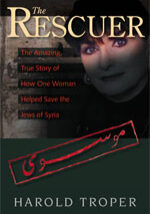In 701 B.C. the Assyrian empire was in its ascendancy. It had already vanquished the kingdom of Israel to the north including the capital at Samaria. It then prepared an assault on Judah and its capital at Jerusalem.
But in one of those significant events that changes the course of world history, Assyria was repelled. Jerusalem was saved until 586 B.C. when the Babylonians sacked the city, forcing its leadership class into exile.
Henry Aubin, in a major feat of scholarship, determines that Jerusalem was aided by a Kushite army from Africa which had marched northeast from the Nile valley. While the Bible attributes the Assyrian retreat to an angel and secular commentators cite pestilence, Aubin, in a meticulously documented work, demonstrates that an alliance with the African nation of Kush bolstered Jerusalem’s defences.
Kush, also known as Nubia, was located in what is now southern Egypt and northern Sudan. A monarchy that existed for more than 1000 years, from 900 B.C. to A.D. 350, Kushites held sway over Egypt from 712 B.C. to about 660 B.C. Of Egypt’s 31 dynasties, this, the 25th Dynasty, is the only one that all scholars agree, was black.
The commander of the Kushite expeditionary force was Taharqa (or as the Bible calls him Tirhakah). This Kushite prince, who had his own interests in halting Assyrian expansion, likely caught the aggressors by surprise as they prepared their siege of Jerusalem.
Aubin offers a thrilling military history and a stirring political analysis of the ancient world. He also sees the event as influential over the centuries.
The Kushite rescue of the Hebrew kingdom of Judah enabled the fragile, war-ravaged state to endure, to nurse itself back to economic and demographic health, and allowed the Hebrew religion, Yahwism, to evolve within the next several centuries into Judaism. Thus emerged the monotheistic trunk supporting Christianity and Islam.

“An important story that had to be told . . . As this book shows, sometimes the power of one is greater than the ignorance of manyâ€
The Globe and Mail
“Over the course of 25 tumultuous, nail-biting, cloak-and-dagger years, this Toronto woman accomplished what entire governments and well-paid professionals could not…the rescue of the Jews of Syria… A fast-paced tour-de-force worthy of any spy novel.â€
National Post
Previously published as The Ransomed of God, Malcolm Lester Books /99
Reissued by
Lester, Mason & Begg 2007
The Rescuer
The Amazing True Story of How One Woman Helped Save the Jews of Syria
After seeing a news report about 12 Syrian Jews blown up in a minefield trying to escape their country, Judy Feld Carr, a Toronto music teacher, wife and mother, knew she had to help. The Jewish population in Syria was living under intense police surveillance, in constant danger of imprisonment and torture. So, with no prior connection to the country or its people, she sprung to action.
For almost 30 years, Judy Feld Carr publicly championed the cause of Syrian Jews while secretly negotiating their escape – dealing with smugglers, bribing officials, haggling over travel documents, arranging medical aid, and funneling money to the needy, even those in prison.
By 1995 she had engineered the rescue of almost 3, 000 Syrian Jews. In the words of the Iraeli Prime Minister Yizhak Rabin, “…for all practical purposes, the entire Syrian Jewish community has left Syria. … Judy, the State of Israel salutes you.â€
The Rescuer is the intensely dramatic story of how one woman moved from her quiet domestic life in Toronto into the shadowy world of international intrigue. It is a remarkable narrative of the heroic and deeply humanitarian actions of one seemingly ordinary woman, a compelling glimpse into the workings of a despotic regime, and a testament to the difference one individual can make on the lives of thousands.
Harold Troper has co-authored several award-winning books including None Is Too Many: Canada and the Jews of Europe (“one of the most important books ever published in Canadaâ€â€”the Literary Review of Canada),Old Wounds: Jews, Ukrainians and the Hunt for Nazi War Criminals; and Immigrants: A Portrait of the Urban Experience. He is a Professor at the Ontario Institute for Studies in Education, University of Toronto.